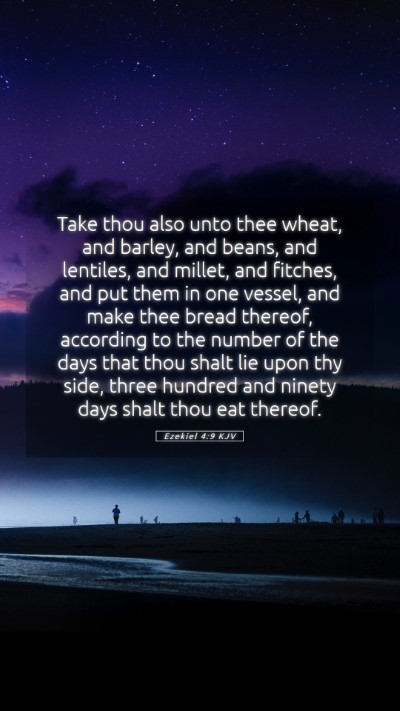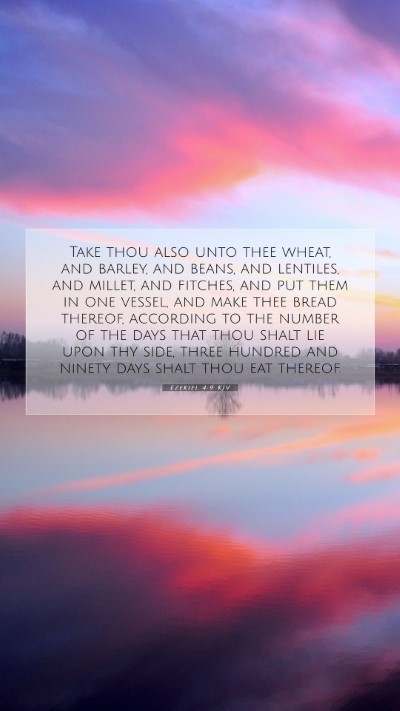Bible Verse Meaning: Ezekiel 4:9
Ezekiel 4:9 states: "Take thou also unto thee wheat, and barley, and beans, and lentils, and millet, and spelt, and put them in one vessel, and make thee bread thereof, according to the number of the days that thou shalt lie upon thy side, three hundred and ninety days shalt thou eat thereof." This verse is rich in symbolism and meaning, offering insight into the profound messages within the Book of Ezekiel.
Overview of Ezekiel 4:9
Ezekiel's actions, directed by God, reflect a dramatic gesture meant to illustrate the coming siege of Jerusalem. This verse is a part of a larger prophetic act where Ezekiel prepares a specific kind of bread to symbolize both sustenance and judgment. The diverse grains mentioned hold significant meaning in the context of biblical sustenance and God's provision during times of trial.
Interpretation and Commentary
-
Matthew Henry's Commentary:
Henry emphasizes the symbolic nature of the ingredients. Each grain represents the people's staple foods, indicating how basic necessities would be affected during the siege. The bread made from these grains becomes a symbol of the people's suffering and divine judgment during their impending trials.
-
Albert Barnes' Notes:
Barnes elaborates on the significance of the number of days (390), associating it with Israel's prolonged suffering due to sin. This extended period reflects God’s righteous judgment as well as His ultimate plan for restoration. The varied grains signify the hardships that Israel would endure, each type representing different layers of their suffering.
-
Adam Clarke's Commentary:
Clarke provides a historical context, suggesting that the ingredients represent a diet of the common people during sieges. He notes how the quality and quantity of food would deteriorate, serving to remind the Jewish people of their reliance on God for sustenance, even in trials. This reflects the broader theme of dependence on God's provision.
Key Insights from Public Domain Commentaries
The collective insights from these commentators highlight several themes regarding Ezekiel 4:9:
- Divine Judgment: The verse signals a warning about the impending judgment on Jerusalem due to the nation's sins.
- Symbolism of Provision: The ingredients used in the bread symbolize the basic necessities, illustrating God's acknowledgement of their physical needs even during divine discipline.
- Historical and Contextual Significance: The act of making bread from these grains offers a poignant reminder of the struggles faced by the people during sieges in biblical history.
- Long-term Consequences of Sin: The lengthy period of consuming this bread underscores the critical understanding of how sin can lead to prolonged suffering.
Application of Ezekiel 4:9
This verse challenges readers today not only to acknowledge the weight of their actions and the consequences of sin but also to recognize God's continual provision amidst trials. Ezekiel's act invites believers to reflect on their dependence on God, both in times of abundance and scarcity.
Cross References
- Jeremiah 14:2-3: Discusses the famine in the land, paralleling the themes in Ezekiel regarding scarcity.
- Lamentations 5:10: Reflects on the hunger and suffering of the people, echoing the despair represented in Ezekiel's prophetic act.
- Matthew 4:4: Jesus cites that man shall not live by bread alone, tying into the spiritual significance of reliance on God.
Conclusion
In summary, Ezekiel 4:9 offers profound insight into the trials faced by the Israelites due to their sins, while simultaneously emphasizing God’s provision even in hard times. This verse, when interpreted with context and understanding, serves as a foundation for deeper theological reflection and personal application in the lives of believers today.


